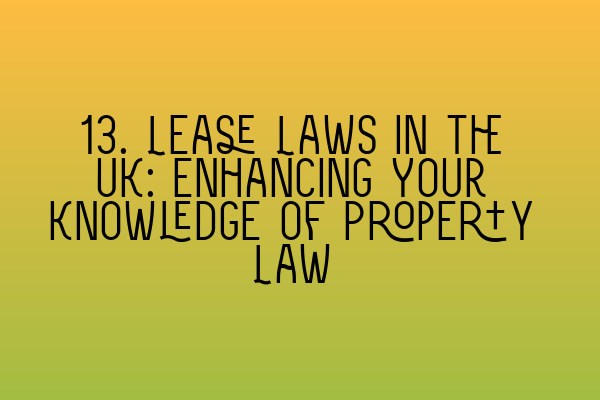13. Lease Laws in the UK: Enhancing Your Knowledge of Property Law
Understanding lease laws in the UK is crucial for both property owners and tenants. Whether you are a landlord or a tenant, having a solid knowledge of property law can help you navigate the complexities and ensure that your rights and obligations are protected. In this article, we will delve into the key aspects of lease laws in the UK, shedding light on important concepts and providing valuable insights. Let’s dive in!
1. What is a Lease?
A lease is a legally binding agreement between a landlord (the property owner) and a tenant (the occupier). It grants the tenant the right to use and occupy the property in exchange for rent, usually for a specified period. It establishes the rights and responsibilities of both parties and outlines the terms and conditions of the tenancy.
It’s important to note that leases can be for residential or commercial properties. Residential leases typically cover houses, flats, or apartments, while commercial leases are used for business or retail premises.
For a more comprehensive understanding of leases, be sure to check out our article on Lease Explained.
2. Types of Leases
There are various types of leases in the UK, and understanding each type is crucial for both landlords and tenants. Here are some common types of leases:
- Assured Shorthold Tenancy (AST): This is the most common type of residential tenancy in the UK. It provides tenants with a minimum 6-month term and offers certain statutory protections.
- Secure Tenancy: These tenancies are found in the social housing sector, providing long-term stability for tenants.
- Commercial Lease: These leases govern the occupation of commercial or business premises and include various types such as Full Repairing and Insuring (FRI) leases, which place the responsibility for repairs and insurance on the tenant.
If you want to learn more about the different types of leases, our article on Types of Leases provides a detailed overview.
3. Lease Terms and Length
The terms of a lease include important information regarding the tenancy, such as the rent amount, payment frequency, duration of the tenancy, and any specific conditions or clauses. The length of a lease can vary depending on the type of property and tenancy. Residential leases typically range from 6 months to several years, while commercial leases can extend to several decades.
To gain a deeper insight into lease terms and length, read our informative article on Understanding Lease Terms.
4. Rights and Obligations
Both landlords and tenants have rights and obligations outlined in a lease. Landlords are responsible for maintaining the property in a safe and habitable condition, ensuring compliance with relevant health and safety regulations. Tenants, on the other hand, must pay rent on time, keep the property clean and in good condition, and adhere to the terms of the lease.
For a comprehensive overview of the rights and obligations of both parties, check out our article on Landlord and Tenant Rights and Obligations.
5. Termination of a Lease
There are various scenarios in which a lease can be terminated. Some common termination methods include:
- Expiration of the lease term
- Mutual agreement between the landlord and tenant
- Eviction due to breach of lease terms
Understanding the termination process is essential for both landlords and tenants. To gain a deeper understanding, read our article on Lease Termination Process.
6. Dispute Resolution
Disputes can arise during the course of a lease, and having an understanding of dispute resolution mechanisms can be essential. Common disputes may include rent arrears, property damage, or failure to repair. It’s important to know your rights and obligations, and seek professional advice if necessary.
To learn more about resolving lease disputes, our article on Lease Dispute Resolution can provide valuable insights.
Conclusion
Having a solid understanding of lease laws in the UK is crucial for both landlords and tenants. It helps protect your rights, navigate the complexities of tenancy, and ensure a favorable and legally compliant relationship. By exploring the topics covered in this article and delving deeper into the related resources we’ve provided, you can enhance your knowledge of property law and become better equipped to handle lease-related matters.
If you’re preparing for the SQE 1 or SQE 2 exams and need additional resources or practice exams, be sure to explore our other articles and courses:
- SQE 1 Practice Exam Questions
- SQE 1 Practice Mocks FLK1 FLK2
- SQE 2 Preparation Courses
- SQE 1 Preparation Courses
- SRA SQE Exam Dates
Remember, knowledge is power, and the more you educate yourself about lease laws, the better equipped you will be to handle property-related issues.
